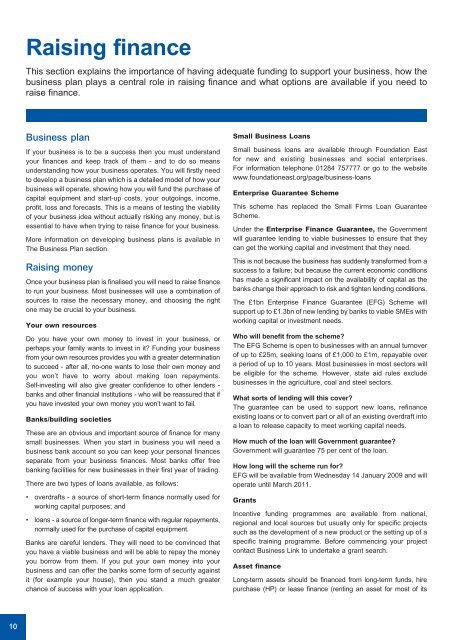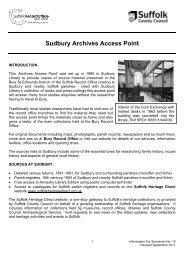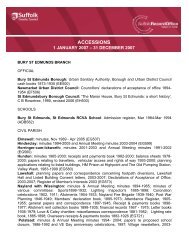starting and growing small business suffolk 06 12 11
starting and growing small business suffolk 06 12 11
starting and growing small business suffolk 06 12 11
- No tags were found...
You also want an ePaper? Increase the reach of your titles
YUMPU automatically turns print PDFs into web optimized ePapers that Google loves.
Raising financeThis section explains the importance of having adequate funding to support your <strong>business</strong>, how the<strong>business</strong> plan plays a central role in raising finance <strong>and</strong> what options are available if you need toraise finance.Business planIf your <strong>business</strong> is to be a success then you must underst<strong>and</strong>your finances <strong>and</strong> keep track of them - <strong>and</strong> to do so meansunderst<strong>and</strong>ing how your <strong>business</strong> operates. You will firstly needto develop a <strong>business</strong> plan which is a detailed model of how your<strong>business</strong> will operate, showing how you will fund the purchase ofcapital equipment <strong>and</strong> start-up costs, your outgoings, income,profit, loss <strong>and</strong> forecasts. This is a means of testing the viabilityof your <strong>business</strong> idea without actually risking any money, but isessential to have when trying to raise finance for your <strong>business</strong>.More information on developing <strong>business</strong> plans is available inThe Business Plan section.Raising moneyOnce your <strong>business</strong> plan is finalised you will need to raise financeto run your <strong>business</strong>. Most <strong>business</strong>es will use a combination ofsources to raise the necessary money, <strong>and</strong> choosing the rightone may be crucial to your <strong>business</strong>.Your own resourcesDo you have your own money to invest in your <strong>business</strong>, orperhaps your family wants to invest in it? Funding your <strong>business</strong>from your own resources provides you with a greater determinationto succeed - after all, no-one wants to lose their own money <strong>and</strong>you won’t have to worry about making loan repayments.Self-investing will also give greater confidence to other lenders -banks <strong>and</strong> other financial institutions - who will be reassured that ifyou have invested your own money you won’t want to fail.Banks/building societiesThese are an obvious <strong>and</strong> important source of finance for many<strong>small</strong> <strong>business</strong>es. When you start in <strong>business</strong> you will need a<strong>business</strong> bank account so you can keep your personal financesseparate from your <strong>business</strong> finances. Most banks offer freebanking facilities for new <strong>business</strong>es in their first year of trading.There are two types of loans available, as follows:• overdrafts - a source of short-term finance normally used forworking capital purposes; <strong>and</strong>• loans - a source of longer-term finance with regular repayments,normally used for the purchase of capital equipment.Banks are careful lenders. They will need to be convinced thatyou have a viable <strong>business</strong> <strong>and</strong> will be able to repay the moneyyou borrow from them. If you put your own money into your<strong>business</strong> <strong>and</strong> can offer the banks some form of security againstit (for example your house), then you st<strong>and</strong> a much greaterchance of success with your loan application.Small Business LoansSmall <strong>business</strong> loans are available through Foundation Eastfor new <strong>and</strong> existing <strong>business</strong>es <strong>and</strong> social enterprises.For information telephone 0<strong>12</strong>84 757777 or go to the websitewww.foundationeast.org/page/<strong>business</strong>-loansEnterprise Guarantee SchemeThis scheme has replaced the Small Firms Loan GuaranteeScheme.Under the Enterprise Finance Guarantee, the Governmentwill guarantee lending to viable <strong>business</strong>es to ensure that theycan get the working capital <strong>and</strong> investment that they need.This is not because the <strong>business</strong> has suddenly transformed from asuccess to a failure; but because the current economic conditionshas made a significant impact on the availability of capital as thebanks change their approach to risk <strong>and</strong> tighten lending conditions.The £1bn Enterprise Finance Guarantee (EFG) Scheme willsupport up to £1.3bn of new lending by banks to viable SMEs withworking capital or investment needs.Who will benefit from the scheme?The EFG Scheme is open to <strong>business</strong>es with an annual turnoverof up to £25m, seeking loans of £1,000 to £1m, repayable overa period of up to 10 years. Most <strong>business</strong>es in most sectors willbe eligible for the scheme. However, state aid rules exclude<strong>business</strong>es in the agriculture, coal <strong>and</strong> steel sectors.What sorts of lending will this cover?The guarantee can be used to support new loans, refinanceexisting loans or to convert part or all of an existing overdraft intoa loan to release capacity to meet working capital needs.How much of the loan will Government guarantee?Government will guarantee 75 per cent of the loan.How long will the scheme run for?EFG will be available from Wednesday 14 January 2009 <strong>and</strong> willoperate until March 20<strong>11</strong>.GrantsIncentive funding programmes are available from national,regional <strong>and</strong> local sources but usually only for specific projectssuch as the development of a new product or the setting up of aspecific training programme. Before commencing your projectcontact Business Link to undertake a grant search.Asset financeLong-term assets should be financed from long-term funds, hirepurchase (HP) or lease finance (renting an asset for most of its10
















